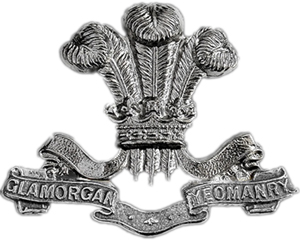Glamorgan Yeomanry
| Glamorgan Yeomanry | |
|---|---|

Glamorgan Yeomanry cap badge
|
|
| Active | 1797 – present |
| Country |
|
| Branch |
|
| Type | Yeomanry |
| Size | Regiment |
| Battle honours |
Boer war South Africa 1900–02 World War I Second Battle of Gaza Third Battle of Gaza Battle of Beersheba Battle of Epehy World War II No battle honours were awarded. It is tradition within artillery units that the Regiment's guns represent its colours and battle honours. |
The Glamorgan Yeomanry was a Yeomanry regiment of the British Army originally raised in the late eighteenth century as a result of concern over the threat of invasion by the French. It also saw service in the Boer War, First World War, Second World War and is today part of a Royal Artillery Territorial Army (TA) unit.
The Glamorgan Yeomanry were formed in 1797, when King George III was on the throne, William Pitt the Younger was the Prime Minister of Great Britain, and across the English Channel, Britain was faced by a French nation that had recently guillotined its King and possessed a revolutionary army numbering half a million men. The Prime Minister proposed that the British counties form a force of Volunteer Yeoman Cavalry that could be called-on by the King to defend the country against invasion or by the Lord Lieutenant to subdue any civil disorder within the country.
On 13 December 1899, the decision to allow volunteer forces to serve in the Second Boer War was made. Due to the string of defeats during Black Week in December 1899, the British government realized they were going to need more troops than just the regular army, thus issuing a Royal Warrant on 24 December 1899. This warrant officially created the Imperial Yeomanry.
The Royal Warrant asked standing Yeomanry regiments to provide service companies of approximately 115 men each. In addition to this, many British citizens (usually mid-upper class) volunteered to join the new regiment. Although there were strict requirements, many volunteers were accepted with substandard horsemanship/marksmanship skills, however they had significant time to train while awaiting transport.
...
Wikipedia
